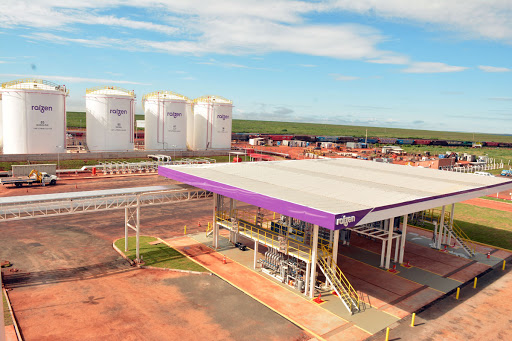
(Fitch Ratings, 28.May.2020) — Fitch Ratings has affirmed Raizen Combustiveis S.A.’s and Raizen Energia S.A.’s Long-Term Foreign and Local Currency Issuer Default Ratings (IDRs) at ‘BBB’ and National Long-Term Ratings at ‘AAA(bra)’. Fitch has also affirmed the rating of Raizen Fuels Finance S.A.’s senior unsecured noted due 2027 at ‘BBB’. The Rating Outlook is Negative for the IDRs and Stable for the National Scale Rating.
The affirmation of Raizen’s ratings incorporate the company’s strong business model that will allow it to preserve a conservative credit profile, partially offsetting the impact of the outbreak of the coronavirus pandemic on commodity prices and fuel demand in Brazil and in Argentina. Although Fitch projects a material reduction in operating cash flow generation in fiscal 2021, Raizen’s credit metrics will not be materially affected, with sound liquidity, low refinancing risk and average net leverage at 2x during the next three years, which provides sufficient headroom under its rating category. The flexibility to reduce dividend payouts to preserve Raizen’s robust credit profile, if necessary, was also factored into the analysis.
Despite the deteriorating operating environment for the Brazilian sugar and ethanol (S&E) market, Raizen’s strategy to maximize sugar production in fiscal 2021 with a large presence of white sugar, thus benefiting from the currently attractive sugar price hedges, and the presence of hedge instruments in gasoline future markets, are expected to attenuate the impact of lower ethanol prices on the company’s EBITDA and cash flow generation. Higher crushed volumes in the ongoing crop season compared to fiscal 2020 and a well balanced mix of own and third-party sugar cane in the mix, which benefits the company’s cost structure in times of depressed commodity prices, will also support Raizen’s EBITDA generation in S&E business.
Raizen’s low degree of operating leverage in the fuel distribution business in Brazil will help mitigate the impact of lower sales volumes on the company’s cash flow. Raizen Combustiveis’s EBITDA is expected to be reduced by 15% in fiscal 2021, and the company’s substantive market share both in Brazil and Argentina will help the company to accelerate the path of performance recovery as demand resumes.
Raizen’s large scale and strong market share position in both segments in which it operates in Brazil remain key credit considerations. The company is the largest S&E processor and second largest player in fuel distribution, and also has operations in downstream, with geographic diversification provided by the Argentinean assets, including an oil refinery. Fitch sees the partnership between Raizen Combustiveis and Femsa Comercio, S.A. de C.V. (FEMSA, IDR A/Stable), announced in 2019, as credit positive, as it will allow Raizen to capture additional value along the fuel distribution chain through the expansion of the convenience franchise store business in and outside of gas service stations. Fitch believes this will help the downstream business to gain additional share over Raizen’s consolidated EBITDA in the future, thus reducing the company’s cash flow exposure to the volatile S&E industry.
Raizen’s Negative Outlook for the IDRs reflects the company’s high exposure to the volatile nature the of S&E business, as well as to the Brazilian and Argentine markets, that together represents more than 75% of EBITDA generation. Fitch’s projection of 6% reduction in Brazilian GDP in 2020 adds challenges to the recovery of ethanol prices and fuel distribution business.
Raizen’s investment grade ratings are based on the combined financial strength of the two operational companies and their mutual financial support and cross guarantees provided. Raizen is a joint venture (JV) and represents an important investment for both its shareholders: Shell (AA-/Stable) and Cosan S.A (Cosan, Long-Term Foreign Currency BB/Negative and Long-Term Local Currency BB+/National Long-Term rating AAA(bra)/ Stable).
KEY RATING DRIVERS
Strong Business Position: Raizen’s ratings incorporate the representative market shares the company holds in its businesses. In the S&E industry, the company is the leading global producer, with an 11% share in Brazil’s sugar cane crushed volumes, and the country’s largest generator of energy from sugar cane bagasse. The company is also the second largest fuel distributor in Brazil with a 20% market share in terms of volumes in 2019, and the acquisition of Shell’s assets in Argentina has increased geographic diversification. Fitch expects the fuel distribution business to account for more than 50% of the combined EBITDA in the medium term, which will be important to reduce the Raizen’s exposure to the more volatile S&E business. The joint-venture with FEMSA will also contribute to increased business diversification and capture additional value along the chain through the expansion of the convenience franchise store business. Fitch expects a meaningful increase in the number of convenience stores, leveraging Raizen’s footprint not only in the fuel distribution market, but also Brazil’s broader retail sector.
Weaker Performance Expected for FY21: Fitch expects the deteriorating operating environment for the Brazilian S&E and fuel distribution industries to have a negative impact on Raizen’s operating performance in the fiscal year ended March 31, 2021, mostly in the fuel distribution business. Fitch expects that the collapsed demand for fuel in Brazil and Argentina due to the coronavirus outbreak and the subsequent contraction of GDP to drive Raizen Combutíveis’s sales volumes down by 10% and 12% in those countries, respectively, in fiscal 2021 compared to fiscal 2020. EBITDA for this segment is expected to drop by 15%, though the low degree of operating leverage is expected to attenuate such impact on EBITDA generation in Brazil. Fitch assumes Raizen’s fuel sales in Brazil in April and May 2020 performed in line with the 40% decline expected by Fitch for the industry as a whole amid restrictions on social mobility imposed by many municipalities and state governments throughout the country.
In S&E, Fitch projects stable EBITDA generation in fiscal 2021, benefiting from attractive sugar hedged positions and the company’s strategy to maximize the sugar mix to up to 60%, with a high presence of white sugar, thus reducing cash flow exposure to the ethanol business. The company is also one of the few players in the Brazilian market with capacity to hedge ethanol prices through the use of derivative instruments, which limits the negative impact of declining prices of the biofuel on its cash flows. Higher crushed volumes in the ongoing crop season and a well balanced mix of own and third-party sugar cane in the mix, which benefits the company’s cost structure in times of depressed prices of the commodity, will also contribute to the company’s EBITDA.
Fitch’s base case scenario considered brent crude prices will average USD 35/bbl in 2020 and USD45/bbl in 2021, comparing unfavorably with USD 65/bbl in 2019, thus limiting the likelihood of meaningful increases in ethanol prices in 2020, despite the steep BRL depreciation. Sugar prices have also been largely impacted in 2020 and implications in 2021 could be magnified if a corresponding decline in the price of ethanol leads S&E producers to divert a larger share of next crop year’s sugar cane harvest to sugar instead of ethanol. For fiscal 2021, Fitch forecasts sugar prices of USD11c/pound including polarization premium for Brazilian sugar, down from USD13.3 c/ pound in FY20.
Positive FCF in FY21: Fitch projects combined EBITDA of BRL6.3 billion and FFO of BRL5 billion in FY21, comparing unfavorably with BRL6.8 billion and BRL5.8 billion, respectively, expected for FY20. Fitch’s base case projections incorporated negative working capital of over BRL700 million for FY21, pressuring CFFO to BRL4.3 billion, compared with BRL7.0 billion expected for FY020. Fitch projects FCF of BRL500 million in fiscal 2021, despite the challenging business environment, and considered no dividends and investments of BRL3.7 billion. In its assumptions Fitch incorporates that the company will follow strict financial discipline by postponing investments in the refinery in Argentina originally scheduled for the year.
Strategic Importance for Shareholders: The ratings incorporate the implicit financial strength and potential support from shareholders. Raizen is the second largest downstream market for Shell globally and is a key vehicle for Shell’s growth in the renewable energy sector. Raizen also benefits from Cosan’s expertise in the S&E business. Fitch’s base case scenario projects that Raizen will pay no dividends in the fiscal FY21 showing the commitment of its shareholders to preserving the company’s capital structure in times of higher uncertainty. Shareholder commitment is also demonstrated by their stand-by USD700 million committed line of credit.
Adequate Leverage: Fitch projects net leverage around 2x over the next three years. Raizen’s net debt/EBITDA ratio was historically below 2x and increased to 2.4x in fiscal 2019 due to the acquisition of Shell’s Argentinean assets for BRL3.6 billion. The company has a well-managed FX exposure. With the exception of a small portion of notes due 2027, all debt is 100% swapped into BRL. Fitch excludes from its leverage calculations all related party liabilities that the company inherited in the context of the creation of the JV in 2011.
Rating Pierces Country Ceiling: Raizen’s FC IDR of ‘BBB’ are three notches higher than Brazil’s ‘BB’ Country Ceiling due to a combination of the following factors: estimated EBITDA in hard currency of about BRL1.5 billion, USD1.0 billion of cash abroad and approximately USD1.0 billion of offshore undrawn committed credit facilities. Fitch projects the ratio of exports, plus cash held abroad and offshore committed undrawn credit facilities to cover hard currency debt service over the next 24 months by 1.8x In line with Fitch’s “Rating Non-Financial Corporates Above the Country Ceiling Rating Criteria”, this allows the company to be rated up to three notches above the Brazilian Country Ceiling.
DERIVATION SUMMARY
Raizen’s investment grade ratings are unparalleled in the Global Sugar and Ethanol (S&E) industry due to its conservative net leverage ratio, robust liquidity and cash flow resilience provided by the downstream business. The positive cash flow contribution from the downstream business and implicit financial strength and potential support from shareholders Cosan and Shell are also key considerations for the ratings.
Raizen’s ratings are four notches above those of Tereos Union de Cooperatives Agricoles a Capital Variable (Tereos; IDR BB-/Negative) due to its lower leverage and Tereos’s higher cash flow exposure to the inherent volatilities of the global agribusiness industry. Raizen also compares favourably with Biosev S.A (Biosev, IDR B/Negative), currently Brazil’s third largest S&E player, which has been reporting negative FCF on a recurring basis, while liquidity and reduced leverage ratios have been largely supported by its parent, Louis Dreyfus Commodities Group (LD).
KEY ASSUMPTIONS
Fitch’s Key Assumptions Within Our Rating Case for the Issuer
–Raizen Energia’s crushed volume of 60 million tons in fiscal 2020 and 62 million tons in fiscal 2021;
–Raizen Combustiveis’ sales volume of 27.1 billion litres in Brazil in fiscal 2020 and a 10% drop in volumes to 24.3 million tons in 2021;
–Sales volume for the Argentinean downstream business of 6.0 billion litres in fiscal 2020 and 12% drop to 5.3 billion litres in fiscal 2021;
–Sugar prices for FY21 are based on currently hedged positions. International sugar prices however are forecast to average USD11c/pound in FY21 including polarization premium for Brazilian sugar and increase gradually to USD12c/pound by FY23;
–Ethanol prices have been forecast to vary in tandem with a combination of oil prices and the FX rate. Brent crude prices have been forecast to go up to USD37/bbl and USD47/bbl in FY21 and FY22, respectively whereas the Brazilian FX rate has been assumed to average BRL4.9/USD and BRL4.6/USD in those years;
–For Raizen Combustiveis’s Brazilian operations, Fitch forecasts unitary EBITDA margin in fiscal 2020 in line with fiscal 2019 and a 10% drop in fiscal 2021;
–Investments of BRL3.7 billion in fiscal 2020 and near BRL4 billion fiscal 2021;
–No dividends in fiscal 2021 and around BRL2.8 billion in fiscal 2022.
RATING SENSITIVITIES
Factors that could, individually or collectively, lead to positive rating action/upgrade:
–An upgrade is unlikely due to the inherent volatilities in the S&E industry and uncertainties relating to fuel policies in Brazil.
Factors that could, individually or collectively, lead to negative rating action/downgrade:
–A downgrade of Brazil’s ratings that results in a downward revision to the Country Ceiling;
–Deterioration of capital structure due to excessive dividend payouts or large debt-financed acquisitions;
–Weaker operating cash flow generation that would lead to a net leverage ratio above 2.5x on a consistent basis;
–Any evidence of a decrease in business importance to Shell.
BEST/WORST CASE RATING SCENARIO
International scale credit ratings of Non-Financial Corporate issuers have a best-case rating upgrade scenario (defined as the 99th percentile of rating transitions, measured in a positive direction) of three notches over a three-year rating horizon; and a worst-case rating downgrade scenario (defined as the 99th percentile of rating transitions, measured in a negative direction) of four notches over three years. The complete span of best- and worst-case scenario credit ratings for all rating categories ranges from ‘AAA’ to ‘D’. Best- and worst-case scenario credit ratings are based on historical performance. For more information about the methodology used to determine sector-specific best- and worst-case scenario credit ratings, visit https://www.fitchratings.com/site/re/10111579.
LIQUIDITY AND DEBT STRUCTURE
Robust Liquidity: Raizen has a track record of maintaining a strong credit profile, underpinned by low leverage and robust liquidity position. Fitch expects Raizen to report readily available cash and marketable securities of over BRL8.0 billion as of March 31, 2020, excluding restricted cash, yielding a cash-to short-term debt coverage ratio between 1.5x and 2.0x. The company has BRL1.8 billion of debt due in fiscal 2022 and debt repayments are well spread thereafter. Around 50% of Raizen’s total debt is due beyond the next five years. Raizen’s liquidity is strengthened by unused revolving credit facilities of USD1.0 billion, including USD700 million from shareholders and USD300 million from a syndicate of international banks due in 2024.
The company remains with robust bankability both in domestic and international banking and capital markets and is able to raise all additional debt on a fully unsecured basis and high tenors. With the exception of a chunk of the 2027 bond (USD300 million out of total debt outstanding of USD500 million), which counts on the natural hedge provided from the company’s exports flow, all of Raizen’s debt is hedged through swap contracts, which benefits the company under a scenario of BRL depreciation. Neither the debt in Argentina is hedged because the USD is Raizen’s the functional currency in the country.
***

